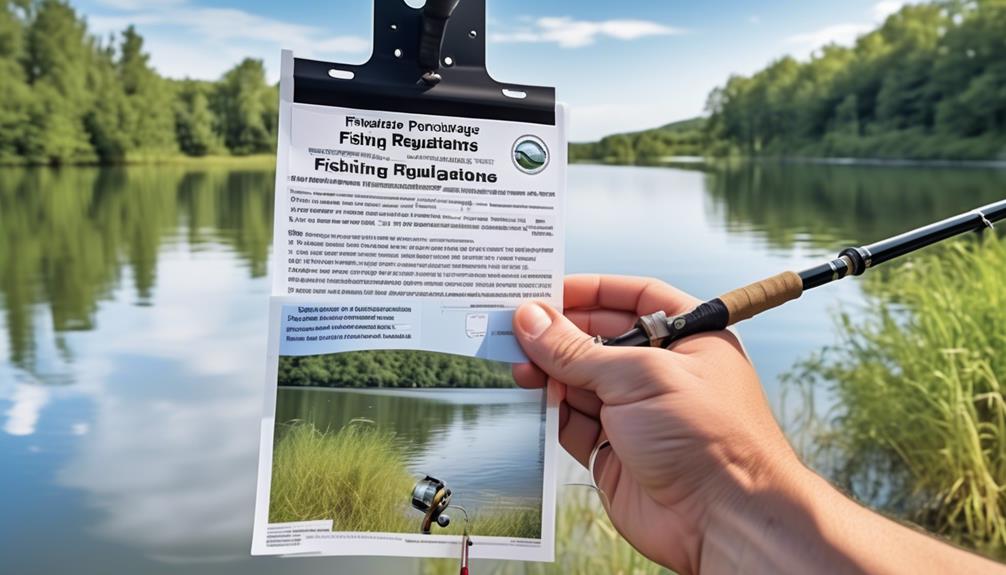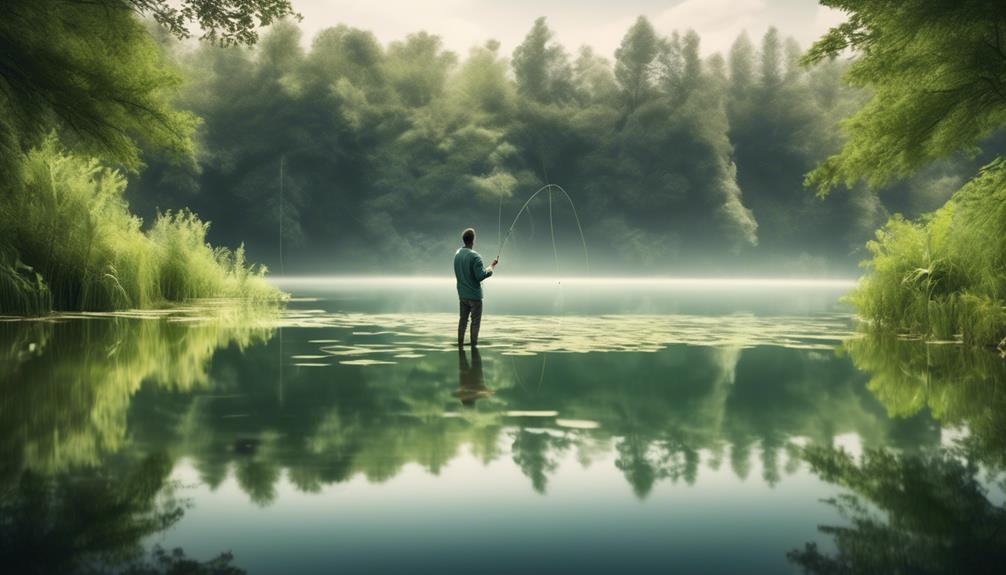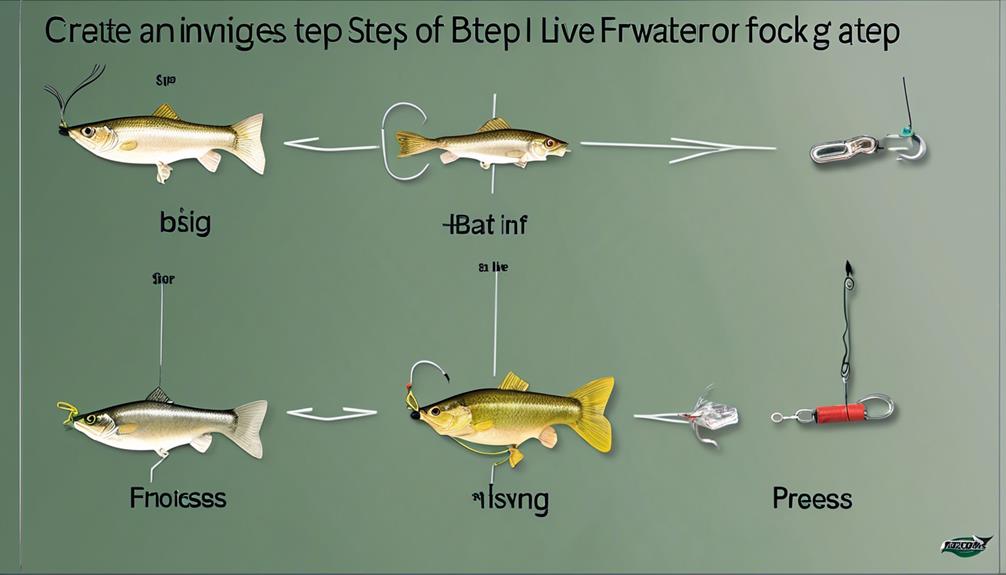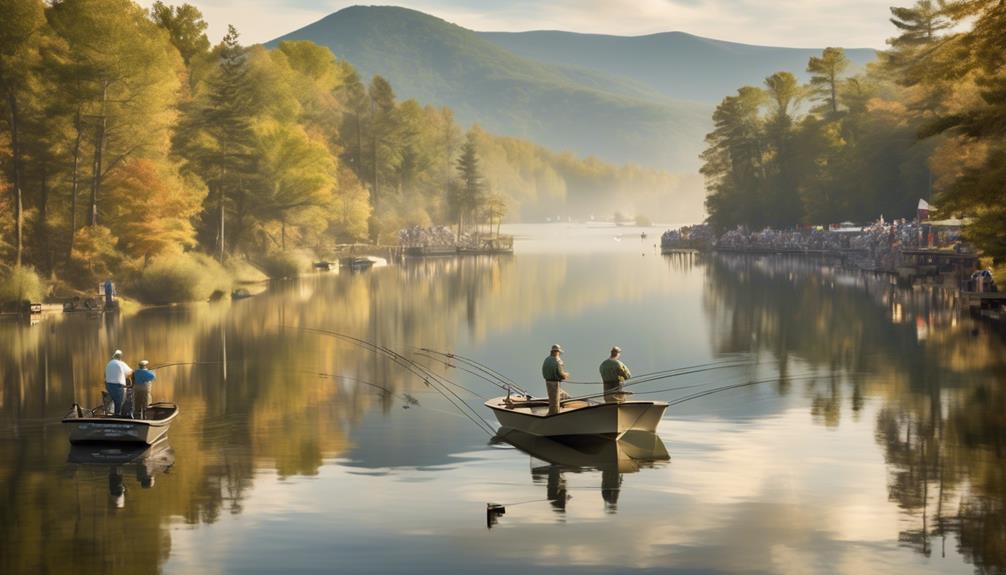Before you head out for your next freshwater fishing trip, it's crucial to be well-versed in the regulations that govern the sport. Understanding legal fishing seasons, size and bag limits, and special fishing zones is just the beginning.
However, there are 14 essential tips that you should be aware of to ensure you stay compliant and contribute to the conservation of aquatic ecosystems. These tips will not only help you avoid potential fines or penalties but also enable you to make a positive impact on the environment.
Know the Legal Fishing Seasons
Make sure to check the fishing regulations for your area to know when you can legally fish for different species. Understanding the legal fishing seasons is crucial to preserving fish populations and ensuring a sustainable environment. By adhering to these regulations, you contribute to the conservation of fish species and their habitats.
When it comes to legal fishing seasons, it's important to consider the type of fishing equipment you use. For instance, certain areas may have specific regulations for the type of fishing gear allowed during certain seasons. By following these guidelines, you can help minimize the environmental impact on fish populations and their ecosystems. Using the appropriate fishing equipment for each season not only keeps you in compliance with the law but also contributes to the overall health of the aquatic environment.
Environmental impact is a significant concern when it comes to fishing during specific seasons. Overfishing during vulnerable periods can lead to a decline in fish populations, disrupting the natural balance of aquatic ecosystems. By understanding and adhering to legal fishing seasons, you actively participate in the conservation of fish stocks and their habitats. This responsible approach helps maintain the delicate environmental equilibrium, ensuring that future generations can also enjoy the pleasures of angling.
Always remember to prioritize conservation by familiarizing yourself with the legal fishing seasons and using appropriate fishing equipment accordingly.
Understand Size and Bag Limits
Understanding the size and bag limits for the fish you catch is essential for responsible freshwater fishing. It ensures that you're contributing to conservation efforts and are aware of the environmental impact of your actions.
Here are some essential tips to help you understand and comply with size and bag limits:
- Understanding catch limits: Familiarize yourself with the specific regulations for the body of water you're fishing in. Different areas may have different limits, so it's crucial to stay informed.
- Measuring fish accurately: Invest in a reliable measuring tool to ensure that you accurately measure the fish you catch. This helps in determining whether a fish meets the size regulations before keeping it.
- Following size regulations: Adhering to size regulations is crucial for sustainable fishing. Return undersized fish to the water to allow them to mature and contribute to the population's health.
- Bag limits enforcement: Be mindful of the number of fish you're allowed to keep. Exceeding bag limits can have detrimental effects on fish populations and overall ecosystem balance.
Research Special Fishing Zones
Consider researching special fishing zones in your area to discover unique regulations and opportunities for freshwater fishing. Special fishing zones are designated areas that often have specific rules and regulations in place to protect and preserve the environment and its inhabitants. These zones are crucial for conservation efforts, as they help in safeguarding protected species and their habitats.
By understanding the regulations specific to these areas, you can ensure that you're contributing to environmental impact and habitat preservation while enjoying your fishing experience.
Researching special fishing zones allows you to gain insight into the distinct rules that may apply, such as catch-and-release requirements for certain species, restricted fishing seasons, or limitations on certain fishing techniques. These regulations are tailored to the unique ecological needs of the area and are aimed at maintaining the balance of the ecosystem. By following these guidelines, anglers can actively participate in conservation efforts while still being able to enjoy the sport of fishing.
In addition to conservation efforts, these special fishing zones often provide opportunities for anglers to witness and appreciate the natural beauty of the area. Whether it's the serene surroundings, diverse wildlife, or pristine waters, these zones offer a chance to connect with nature in a way that emphasizes the importance of environmental stewardship.
Therefore, taking the time to research and understand the regulations of special fishing zones can lead to a more fulfilling and environmentally conscious fishing experience.
Comprehend Bait and Tackle Restrictions
To ensure compliance with freshwater fishing regulations, familiarize yourself with any bait and tackle restrictions specific to the areas you plan to fish in. Understanding gear regulations is crucial for a successful fishing trip. Here are some essential tips to help you comprehend bait and tackle restrictions:
- Selecting appropriate bait: Different bodies of water and regions have specific rules about the type of bait that can be used. Make sure to research and understand the regulations regarding bait selection in the area you'll be fishing in.
- Tackle restrictions: Many areas have restrictions on the types of tackle that can be used. This includes the size and types of hooks, weights, and lures. Ensure that your tackle complies with the local regulations to avoid fines or penalties.
- Choosing the right equipment: It's important to choose the right equipment that not only complies with regulations but also suits the specific type of fish you're targeting. Understanding the local fish species and their behavior will help you select the appropriate equipment for a successful fishing experience.
Learn About Catch and Release Rules
Before you cast your line, it's important to be aware of the catch and release rules in the area you plan to fish, as this knowledge complements your understanding of bait and tackle restrictions. Proper handling of fish during catch and release is crucial for their survival. When practicing catch and release, it's essential to minimize the time the fish is out of the water. Always wet your hands before handling the fish to avoid removing its protective slime layer, which can make it more susceptible to diseases. Additionally, using barbless hooks can make the releasing process smoother and less harmful to the fish.
Conservation efforts heavily rely on catch and release rules. By releasing fish back into the water, it allows them to continue breeding and maintaining the ecological balance of the freshwater ecosystem. It's important to be mindful of the specific catch and release regulations of the area you're fishing in, as these rules may vary by location and species. Some areas may have specific size or species restrictions for catch and release, so familiarize yourself with the regulations beforehand to ensure you're in compliance.
Familiarize Yourself With Licensing Requirements
Ensure that you have the necessary fishing license before heading out to your chosen fishing spot. Familiarizing yourself with the licensing requirements is crucial to ensure a smooth and enjoyable fishing experience. Here are some essential aspects to consider:
- License Exemptions: Some states offer license exemptions for certain groups, such as senior citizens, veterans, or individuals with disabilities. Familiarize yourself with these exemptions to see if you qualify.
- Age Limits: Be aware of any age limits for fishing licenses. Some states have specific age requirements for obtaining a fishing license, so it's important to check the regulations to ensure compliance.
- Non-Resident Permits: If you're planning to fish in a state where you aren't a resident, you'll likely need to obtain a non-resident fishing permit. Research the requirements and application process for non-resident permits in your desired fishing location.
- Reciprocity Agreements: Some states have reciprocity agreements with others, allowing individuals with a fishing license from one state to fish in another state under certain conditions. Understand the terms of these agreements if you intend to fish across state lines.
Understanding these licensing requirements will help you avoid potential fines or legal issues while enjoying your fishing trip. Always ensure that you're in compliance with the regulations of the specific area where you plan to fish.
Stay Informed on Local Water Body Regulations
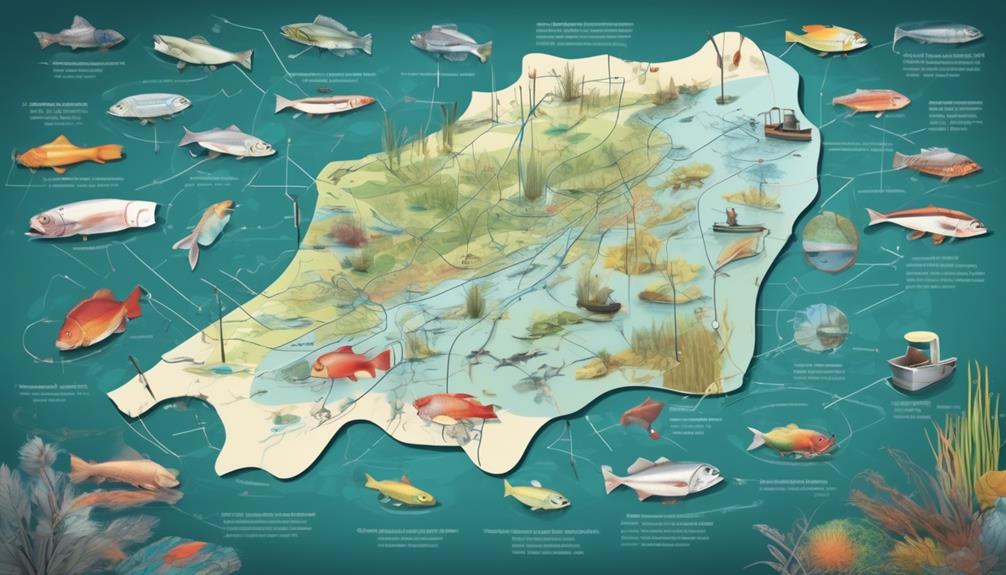
Before casting your line into any local water body, familiarize yourself with the specific fishing regulations that govern that area. Staying informed about local water body regulations is crucial to ensure responsible angling and environmental conservation.
Local fishing associations and community outreach programs are valuable resources for obtaining the most current information on fishing regulations. These organizations often work closely with regulatory agencies to disseminate updates and educate anglers about the rules and guidelines that apply to different water bodies.
Conservation efforts are at the heart of fishing regulations, aiming to protect the delicate balance of aquatic ecosystems and ensure sustainable fish populations. Understanding and adhering to local water body regulations play a significant role in minimizing the environmental impact of recreational fishing. By staying informed and compliant, anglers contribute to the preservation of aquatic habitats and the overall health of freshwater ecosystems.
Local fishing associations often conduct outreach programs to raise awareness about the importance of following fishing regulations for the long-term well-being of natural water bodies. These initiatives not only promote responsible angling practices but also foster a sense of stewardship among anglers, encouraging them to actively participate in the conservation of local waters.
Follow Best Practices for Conservation
Familiarizing yourself with local water body regulations not only ensures responsible angling but also empowers you to follow best practices for conservation, contributing to the long-term well-being of natural water bodies. By adhering to conservation efforts and sustainable practices, you play a crucial role in preserving freshwater ecosystems and maintaining fish populations for future generations.
Here are some essential best practices to incorporate into your freshwater fishing endeavors:
- Catch and Release: Whenever possible, practice catch and release to help sustain fish populations. Handle fish with care, use barbless hooks, and release them quickly to minimize stress and maximize their chances of survival.
- Proper Disposal of Fishing Line and Tackle: Dispose of fishing lines, hooks, and other tackle properly to prevent wildlife from getting entangled and injured. Many fishing lines and tackle are non-biodegradable and can persist in the environment, posing a threat to aquatic life.
- Respect Wildlife and Habitat: Minimize disturbance to aquatic plants and wildlife. Avoid fishing in areas with spawning fish or sensitive habitats, and be mindful of the impact your presence may have on the ecosystem.
- Support Conservation Organizations: Get involved with or support local conservation organizations dedicated to preserving freshwater habitats. These groups often organize clean-up efforts, habitat restoration projects, and advocate for sustainable fishing practices.
Frequently Asked Questions
Can I Fish in a Freshwater Lake if I Don't Have a Fishing License?
You can't fish in a freshwater lake without a fishing license. It's essential to follow fishing license requirements to support conservation efforts in freshwater lakes. Make sure to obtain the necessary permits before casting your line.
Are There Any Specific Regulations for Fishing in a National Park or Wildlife Refuge?
You must follow specific regulations when fishing in national parks and wildlife refuges. These rules cover fishing without a license, protected species, bait restrictions, and reporting violations. Be aware of these guidelines to avoid penalties.
What Should I Do if I Accidentally Catch a Protected or Endangered Species While Fishing?
If you accidentally catch a protected or endangered species while fishing, report it to the authorities as per conservation guidelines. Follow regulations and release the species safely. It's essential to protect these vulnerable animals.
Are There Any Restrictions on Using Live Bait or Artificial Lures in Certain Areas?
In certain areas, you might encounter bait restrictions and lure regulations. Make sure to check the local fishing regulations for any specific rules about using live bait or artificial lures to avoid any penalties.
How Do I Report a Violation of Freshwater Fishing Regulations?
If you witness a violation of freshwater fishing regulations, report it immediately to local wildlife authorities. Failure to report violations can result in legal consequences, so be sure to follow the reporting process.
Conclusion
Now that you've familiarized yourself with these essential tips for understanding freshwater fishing regulations, you're ready to hit the water with confidence.
Remember to always stay informed on the latest regulations, follow size and bag limits, and practice catch and release whenever possible.
By understanding and following the rules, you can help preserve and protect the freshwater fishing experience for generations to come.
Happy fishing!
